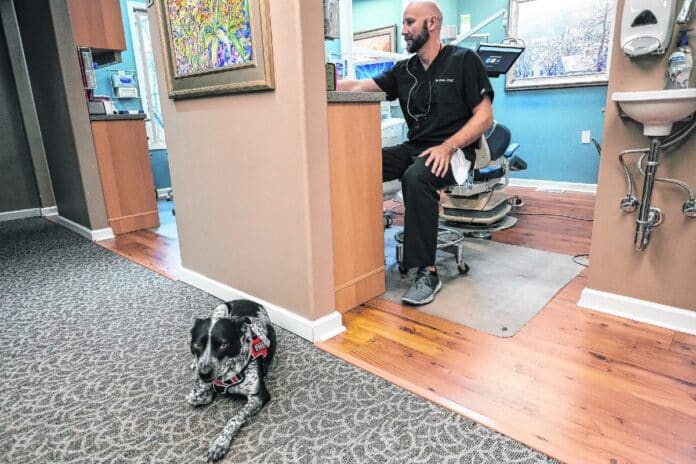
A local dentist’s office has brought in a specially-trained, but rather unconventional, assistant to help take the edge off for patients with dental care anxiety.
With a red vest strapped around her torso and a seemingly uncanny ability to charm patients, Lucy, a 2-year-old rescued blue heeler mutt, has been making the rounds at Tipton Lakes Family Dentist, 4570 W. Jonathan Moore Pike, since late July. She’s working to help patients feel more comfortable as they receive dental treatment.
“We’ve got her trained already to sit with kids,” said Dr. Christopher Bartels, who owns Lucy’ and the practice at Tipton Lakes Family Dentist. “While we’re working, she’ll come in and stop in each operatory. If the patient reaches their hand out, she’ll let them pet for a minute. If a patient ignores her like they don’t want to deal with her, then she’ll just go on to the next room.”
Bartels and his family adopted Lucy in June after spotting her at a farmers’ market in Columbus and have gradually been training her to be an emotional support dog at the dental practice. The idea, Bartels said, is to help change the negative perception some people have of going to the dentist, especially among people who may have had a traumatic experience in the past or may have anxiety or fear when getting dental work done. A support animal like Lucy also can help special needs children, Bartels said.
[sc:text-divider text-divider-title=”Story continues below gallery” ]Click here to purchase photos from this gallery
“I got the idea from a dentist out on the West Coast,” Bartels said. “He brought in a therapy animal and just noticed a big difference. The main things we wanted her for were patient anxiety, and the just the perception of the dentist, what people feel like when they come in. If we can change that perception, that is the biggest thing. That’s the very first step, especially people who had traumatic experiences as children. Those are the people who are very nervous at the dentist.”
On Friday morning, Lucy was perched on top of a staircase that led to the dental work stations, silently surveying the patients and staff as they moved around the office. She has her own dental office ID which is clipped to her harness.
After a few minutes, she glided down the stairs and rested on her stomach between a couple of the stations, occasionally poking her head into a room with a patient amid the sounds of dental equipment and the hum of people talking — without making so much as a sound.
“It’s about getting your attention off the fact that you’re at the dentist,” Bartels said of Lucy’s movements around the patients.
A tough start
Lucy was found pregnant in Nashville, Tennessee, about eight months ago and was scheduled to be euthanized because the shelter she had been taken to was overcrowded, Bartels said.
Columbus’ Community Animal Rescue Effort, or C.A.R.E., adopted Lucy and she gave birth to five puppies.
About a month after C.A.R.E. took Lucy in, Bartel and his wife, Jana, and their three children adopted her after seeing her at a farmers’ market. Their children named her.
“When we went to the C.A.R.E. program, we had been looking for an animal for years because it takes the right overall mental attitude,” Bartels said. “Finally one day, actually it was at the farmers’ market, we saw her. My wife and I watched for a good half hour at how she was interacting with people. …You could just tell by the well the way she interacted with people that she was a really good fit, just mild-mannered and mellow.”
So far, Lucy has been a “great fit,” he said.
Hours of training
Bartels said he has spent “a lot of hours” training Lucy, including going through a range of training scenarios and reading training books, among other things.
“Dogs in a scenario like this need to be very mellow and very laid back and understanding,” Bartels said. “Basically, that is the hardest thing, just getting her to understand the day-to-day (environment), the sound of instruments, the sound of people talking, things like that.
“There is nobody out there that does specific medical office training,” he said.
About a month after adopting Lucy, Bartel said he started bringing her into the dental office on a leash and walking her around the office to get her used to the atmosphere and people. He gradually began increasing the number of hours the dog was around the office. Currently, Lucy works about 20 to 25 hours per week.
Lucy is trained to stay in the reception area, children’s area and the dental work stations, Bartels said. Since late July, she has only barked in the office twice, he said.
“Safety is the biggest thing that we focus on,” said Bartels. “With an animal, they have instincts and things like that. So (we put) her through different scenarios so we can make sure that we have no incidents or things like that.”
Lucy is trained to not approach children, but rather let children approach and pet her, said Bartels, who added that he hopes to train Lucy to be able to get into dental chairs with patients.
“I’d like for her to be able to get up into chairs in the next six months, with kids first,” he said. “…I hope within a year to have her in chairs with adults as well.”
[sc:pullout-title pullout-title=”Pull Quote” ][sc:pullout-text-begin]
“It’s about getting your attention off the fact that you’re at the dentist.”
— Dr. Christopher Bartels, Lucy’s owner and dentist at Tipton Lakes Family Dentist
[sc:pullout-text-end]




